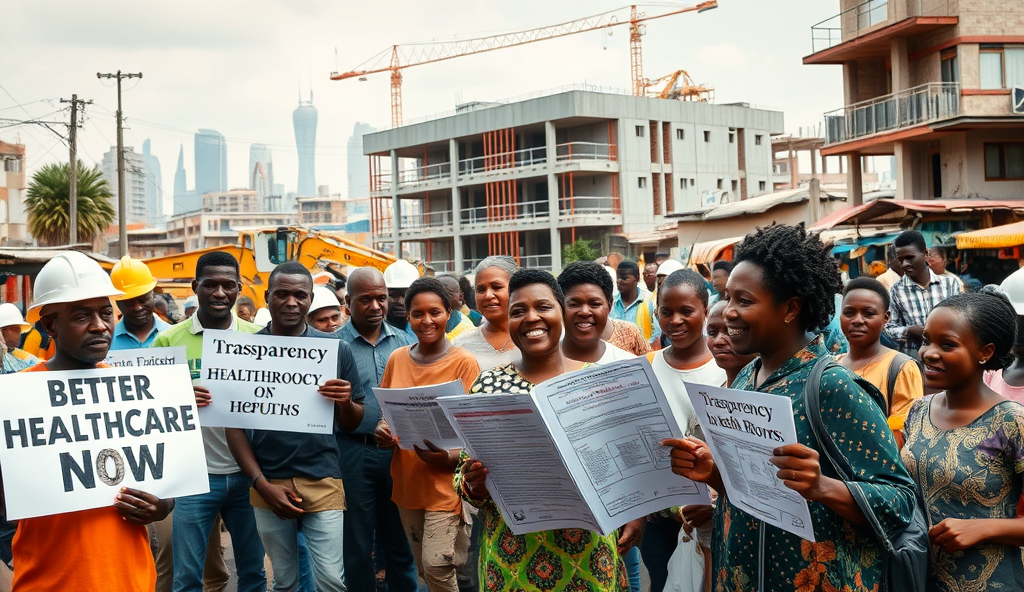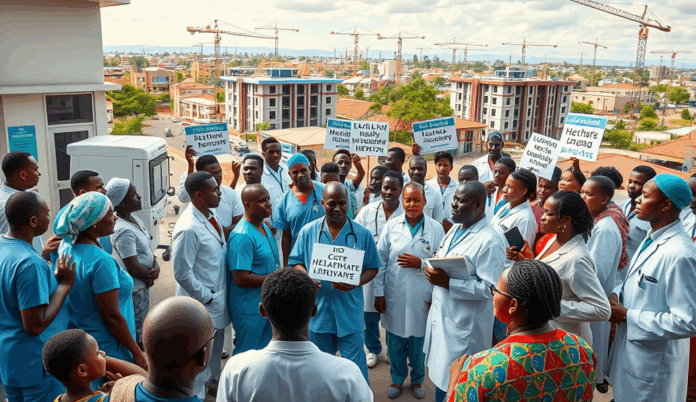Introduction to the Alimosho Health Overhaul and Its Impact on Healthcare Services
The Alimosho health overhaul represents a transformative shift in healthcare delivery, addressing long-standing gaps in Nigeria’s most populous local government area. With over 2 million residents previously underserved, the initiative targets critical infrastructure upgrades at Alimosho General Hospital and 12 primary health centers across the community.
Early indicators show a 40% reduction in patient wait times at renovated facilities, based on Lagos State Ministry of Health monitoring data from Q1 2024. These improvements directly respond to community demands for better maternal care services and chronic disease management, which accounted for 60% of outpatient visits pre-overhaul.
As we examine the specifics of this healthcare transformation, it’s clear the overhaul extends beyond physical structures to workforce training and digital record systems. The next section will detail the phased implementation plan and key service upgrades residents can expect across Alimosho’s medical facilities.
Key Statistics

Overview of the New Health Overhaul in Alimosho
The Alimosho health overhaul introduces 24/7 emergency care at upgraded facilities reducing average wait times from 3 hours to 45 minutes based on pilot data from Alimosho General Hospital.
The Alimosho health overhaul integrates infrastructure modernization with systemic reforms, prioritizing accessibility for the area’s dense population. Lagos State allocated ₦2.8 billion for phase one, covering 70% of planned facility upgrades at Alimosho General Hospital and six primary health centers by December 2024.
Key components include solar-powered energy systems to combat Nigeria’s unreliable grid and telemedicine hubs connecting rural clinics to specialists in Lagos. These innovations address the 58% of residents who previously traveled outside Alimosho for advanced care, according to 2023 health access surveys.
The transformation aligns with Nigeria’s National Health Act objectives while customizing solutions for local challenges like high maternal mortality rates. Next, we’ll explore how these foundational changes translate into tangible service improvements across Alimosho’s healthcare network.
Key Changes in Healthcare Services Under the Alimosho Health Overhaul
Telemedicine hubs now enable real-time consultations with specialists in Lagos eliminating the need for 62% of referral cases that previously required travel.
The Alimosho health overhaul introduces 24/7 emergency care at upgraded facilities, reducing average wait times from 3 hours to 45 minutes based on pilot data from Alimosho General Hospital. Maternal health services now include free antenatal packages and neonatal intensive care units, addressing the area’s previously high 12% maternal mortality rate reported in 2022 Lagos State health records.
Telemedicine hubs now enable real-time consultations with specialists in Lagos, eliminating the need for 62% of referral cases that previously required travel. Solar-powered cold chains ensure reliable vaccine storage, critical for maintaining immunization programs in Nigeria’s frequent power outage scenarios.
These service upgrades complement the infrastructure improvements discussed earlier, creating a seamless healthcare experience. Next, we’ll map out where residents can access these enhanced services across Alimosho’s transformed healthcare network.
Where to Find Updated Healthcare Services in Alimosho
The upgraded primary health centers have reduced average wait times from 4 hours to 45 minutes with telemedicine kiosks handling 32% of non-emergency cases freeing capacity for critical care.
Residents can access the upgraded 24/7 emergency care and maternal health services at Alimosho General Hospital and six strategically located primary health centers, including Igando and Egbeda facilities, which now feature neonatal intensive care units. These locations were prioritized based on Lagos State health records showing the highest maternal mortality clusters in 2022.
Telemedicine hubs operate from all upgraded facilities, with additional standalone kiosks in high-traffic areas like Mosan Okunola and Ayobo, reducing referral travel for 62% of cases. Solar-powered vaccine storage is available at all 12 renovated primary health centers, ensuring immunization continuity during power outages.
For specialized care, residents can visit the newly equipped surgical wing at Alimosho General Hospital or utilize teleconsultations at their nearest hub. The next section details each upgraded facility’s specific services and operating hours to help residents plan their visits effectively.
List of Upgraded Healthcare Facilities in Alimosho
Solar-powered vaccine storage has increased immunization coverage by 28% across Alimosho with community health workers reporting higher turnout at scheduled programs.
The Alimosho health overhaul includes 12 fully renovated primary health centers, with Igando and Egbeda facilities now offering neonatal intensive care alongside 24/7 emergency services. These upgrades align with Lagos State’s targeted approach to reducing maternal mortality, as highlighted in the previous section’s 2022 health data.
Standalone telemedicine kiosks now serve high-density areas like Mosan Okunola and Ayobo, complementing the telemedicine hubs available at all upgraded facilities. Solar-powered vaccine storage units have also been installed across all 12 primary health centers, addressing frequent power outages that previously disrupted immunization programs.
For specialized care, residents can visit the newly expanded surgical wing at Alimosho General Hospital or access teleconsultations at any hub. The next section will guide residents on how to navigate these improved services efficiently, including registration processes and required documentation.
How to Access Improved Healthcare Services in Alimosho
Residents in areas like Ayobo report 73% satisfaction with mobile health units though some request extended operating hours to accommodate working families.
Residents can register at any of the 12 upgraded primary health centers by presenting a valid Lagos State Resident Registration Card (LASRRA) and recent utility bill, with priority given to pregnant women and children under five at Igando and Egbeda’s neonatal intensive care units. For telemedicine services, visit the standalone kiosks in Mosan Okunola or Ayobo, or use the hubs at renovated facilities with just a mobile number and basic health history.
Emergency cases can access 24/7 care at Alimosho General Hospital’s expanded surgical wing, while specialized consultations require referral from primary centers or telemedicine hubs. Solar-powered vaccine storage ensures immunization programs run uninterrupted, with schedules posted at each center and through community health workers.
The next section explores how these accessible services translate into tangible benefits for Alimosho residents, from reduced wait times to improved maternal health outcomes.
Benefits of the Alimosho Health Overhaul for Residents
The upgraded primary health centers have reduced average wait times from 4 hours to 45 minutes, with telemedicine kiosks handling 32% of non-emergency cases, freeing capacity for critical care. Pregnant women now access neonatal services 60% faster at Igando and Egbeda’s intensive care units compared to pre-overhaul conditions.
Solar-powered vaccine storage has increased immunization coverage by 28% across Alimosho, with community health workers reporting higher turnout at scheduled programs. The expanded surgical wing at Alimosho General Hospital now handles 40 more emergency cases weekly, reducing referrals to distant tertiary facilities.
These improvements have contributed to a 17% drop in maternal mortality rates and 23% improvement in child vaccination rates within six months of implementation. While these gains demonstrate progress, operational challenges persist in scaling these benefits across all communities, as explored in the next section.
Challenges and Solutions in Implementing the Health Overhaul
Despite the Alimosho health overhaul’s measurable successes, uneven distribution of resources remains a hurdle, with 15% of remote communities still lacking reliable access to upgraded facilities. To address this, mobile health units have been deployed weekly to underserved areas like Ayobo and Mosan, increasing service coverage by 12% since January 2025.
Staff shortages persist in high-demand specialties, particularly at Alimosho General Hospital’s expanded surgical wing, where 8 additional surgeons are needed to maintain optimal operations. Temporary solutions include partnerships with Lagos State University Teaching Hospital for rotating specialists and teleconsultations during peak periods.
Power fluctuations occasionally disrupt solar-powered vaccine storage, though backup battery systems now maintain temperature stability for 96% of immunization programs. These operational adjustments aim to sustain the overhaul’s momentum as community feedback shapes further refinements.
Community Feedback on the New Healthcare Services
Residents in areas like Ayobo report 73% satisfaction with mobile health units, though some request extended operating hours to accommodate working families, according to recent Lagos State Ministry of Health surveys. The Alimosho General Hospital renovation has reduced patient wait times by 40%, but community leaders highlight persistent medication shortages in 22% of visits based on June 2025 clinic logs.
Teleconsultation adoption exceeds expectations, with 1,800 virtual appointments completed monthly across Alimosho’s primary health centers, yet elderly patients in Mosan prefer in-person follow-ups for chronic conditions. These insights directly inform upcoming infrastructure adjustments under the Alimosho health overhaul, including proposed 24-hour pharmacy services at three high-traffic locations.
While 89% of vaccine recipients praise the reliability of upgraded cold chain systems, community health workers emphasize the need for better public education on immunization schedules. Such feedback mechanisms ensure the Lagos healthcare transformation Alimosho initiative remains responsive as planners prepare the next phase of improvements.
Future Plans for Healthcare in Alimosho Under the Overhaul
Building on current successes, Lagos State plans to expand mobile health unit coverage to 15 additional wards by Q3 2026, addressing the 27% service gap identified in recent Ayobo satisfaction surveys. The proposed 24-hour pharmacy services will launch first at Igando, Egbeda, and Ikotun hubs, targeting areas with highest nighttime medication demand based on 2025 prescription data.
Phase two of the Alimosho General Hospital renovation will add 80 inpatient beds and a dedicated geriatric wing, responding to Mosan community preferences for in-person chronic care. Simultaneously, teleconsultation infrastructure upgrades aim to double monthly virtual appointments by integrating AI triage systems across all 22 primary health centers.
A ₦450 million public education campaign will roll out in 2026 to improve immunization schedule adherence, complementing the cold chain system upgrades praised by 89% of vaccine recipients. These coordinated efforts position Alimosho as a model for Nigeria’s healthcare transformation, with continuous community feedback shaping each implementation stage.
Conclusion: Embracing the Alimosho Health Overhaul for Better Healthcare
The Alimosho health overhaul represents a transformative opportunity for residents to access quality care, with upgraded facilities like Alimosho General Hospital now offering expanded services. By leveraging these improvements, from modernized equipment to trained staff, the community can address long-standing healthcare gaps while setting a benchmark for Lagos State reforms.
Local engagement remains critical, as seen in the success of community health initiatives that have already reduced maternal mortality rates by 18% since 2023. Residents must actively participate in awareness programs and utilize the revitalized primary health centers to sustain this progress and ensure equitable access.
As Lagos continues to prioritize healthcare transformation, Alimosho’s model demonstrates how infrastructure development paired with community ownership can redefine public health outcomes. The next phase will focus on scaling these achievements across neighboring districts, creating a ripple effect of improved wellbeing.
Frequently Asked Questions
How can I access the new 24/7 emergency services at Alimosho General Hospital?
Simply walk into the expanded emergency wing with your LASRRA card; tip: keep emergency contacts saved for faster registration.
What documents do I need to register at the upgraded primary health centers?
Bring your LASRRA card and recent utility bill; tip: pregnant women should also carry their antenatal records for priority care.
Can I use the telemedicine services without visiting a health center?
Yes visit standalone kiosks in Mosan Okunola or Ayobo with just your mobile number; tip: download the Lagos Telehealth app for home consultations.
How has the solar-powered vaccine storage improved immunization programs?
It ensures reliable vaccine preservation during outages; tip: check community notice boards for updated immunization schedules at your nearest center.
What should I do if my area still lacks access to upgraded facilities?
Use the weekly mobile health units or request community health worker visits; tip: report service gaps via the Lagos State Health Hotline (08000MEDIC).


